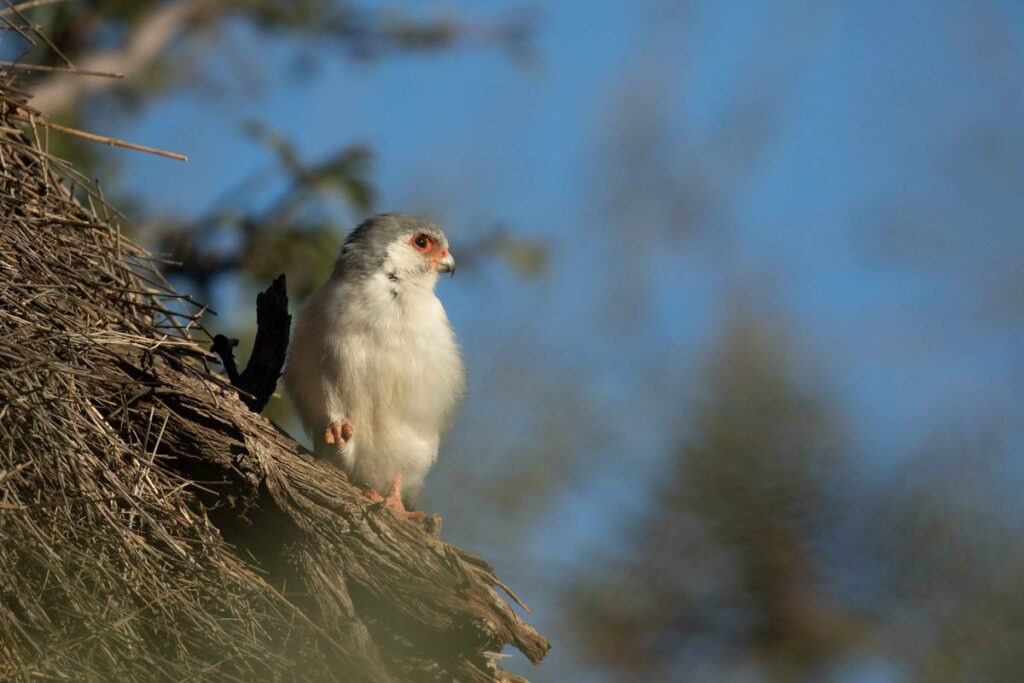African Pygmy Falcons and Sociable Weaver nests

AFRICAN PYGMY FALCONS & SOCIABLE WEAVER NESTS
Academic affiliation: University of Cape Town
PhD students: Olufemi Olubodun, Timothy Khan Aikins
Principle researchers and supervisors: Robert Thomson, Anthony Lowney
Positive associations are predicted to be more important in communities persisting in harsh environments. This project explores the ecosystem engineering role of Sociable weaver (Philetairus socius) nests to the animal and plant community in the Kalahari. We investigate the role of colonies as a resource to other organisms and investigate the interplay of positive and negative interactions with host trees and the biodiverse communities that assemble at nests. We further study the life history of pygmy falcons (Polihierax semitorquatus), an obligate associate of weaver colonies, focusing on impacts this species has on sociable weavers and the wider community.
KEY RESEARCH OBJECTIVES:
- – Examine the importance of sociable weavers (Philetairus socius) to Kalahari animal and plant communities
- – Investigate the diversity of animals associated with the nests, the interactions between these species, and to gain insights into the life histories of associated species, particularly the African pygmy falcon (Polihierax semitorquatus).
- – Aim to understand how the ‘ecological engineer’ potential of these nests may have community wide impacts on structure and function in both animal and plant communities, and how this impact may change across environmental gradients.
PROGRESS UPDATE AND KEY FINDINGS FROM 2021:
- – Analysis of data collected over a 10-year period, between 2011 and 2020, to understand the population-level breeding biology of pygmy falcons. During this time, 356 active pygmy falcon territories and 323 breeding attempts were monitored.
- – It was found that pygmy falcons were four times more likely to reside in colonies in camel thorn trees than those in shepherds trees and that their breeding season is mainly between August and February, peaking in September and October. Additionally, falcons that initiated their clutches during September were more likely to produce chicks that successfully fledge. Clutch sizes varied between one and three eggs (mean = 2.39) with two chicks successfully fledging, on average.
- – To determine the costs and benefits to trees hosting sociable weaver nests, we have collected more field data and carried out further tests in the laboratories back at the University of Cape Town. The results reveal camel thorn and shepherd’s trees increase levels of soil nitrogen (N), phosphorus (P), and carbon (Ca) between 1.3 and 2.4 times compared to grassland areas. However, the presence of a sociable weaver nests in both tree species increased this further with N, P, and Ca being observed to be between 2.1 and 5.0 times greater than at trees without a nest. These soil properties also varied with increasing tree size and sociable weaver colony size. Our data show that the soils under nest trees supports the growth of camel thorn seedlings despite the soil directly under the nest area being barren with no plant growth. We found significantly higher growth, biomass and foliar nutrients for camel thorn seedlings on nest tree soils compared to those growing in grassland and tree soils.
- – The impact of high soil nutrient concentrations below weaver nests on the sub-canopy vegetation communities has also been studied. This data collection took place when Tswalu hosted the UCT Conservation Biology Masters programme in October 2021 – the data will be analysed in 2022.
- – Long-term data collection in collaboration with the Kalahari Ecosystems Engineer Project (KEEP) continues. Here we repeatedly conduct bird and nest surveys to understand the effects changing environmental conditions may have on bird populations at Tswalu.
– – – – – – – – – – – – – – – – – – – –
GET INVOLVED
Use our secure online portal to make a donation to the Tswalu Foundation Trust in support of the sustainability of ongoing research management of the many projects supported by the foundation, its researchers and various activities.
DONATE